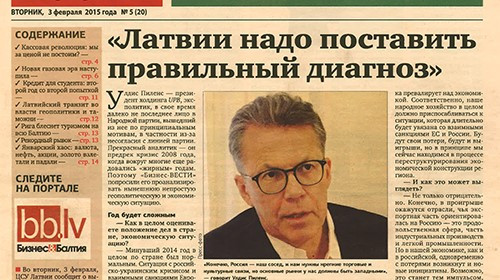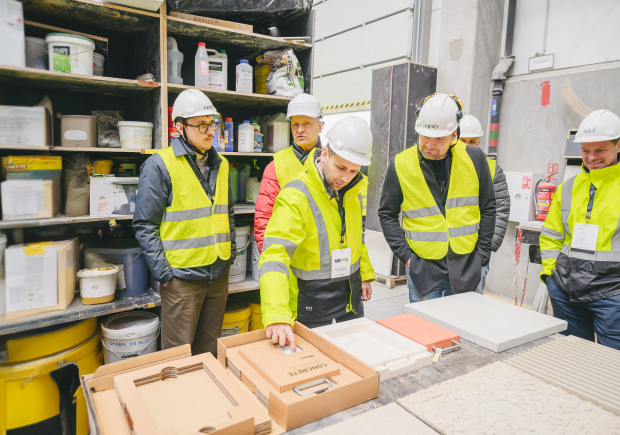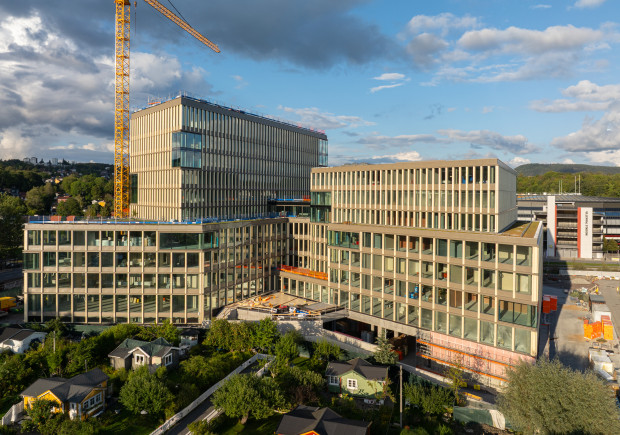Uldis Pīlēns, the head of the UPB holding, was born in 1956; he obtained the architectural engineering diploma at the Weimar Academy of Architecture and Construction. The concept of the Liepāja Special Economic Zone was developed at the initiative of U. Pīlēns. For his contribution in cooperation between Sweden and Latvia, he was awarded one of the highest honours of the of the Kingdom of Sweden: the Order of the Polar Star, Knight 1st Class.
The UPB holding was founded in 1991 as an architectural agency with several employees. Currently, this is one of Latvia’s largest industrial corporate groups, comprising over 40 businesses in nine countries. In 2014, the holding entered the list of 100 most valuable companies in Latvia, and became the most valuable company in the construction industry.
Sweden is its largest export market. One of the objects built by UPB in this country —the Skandion clinic in Uppsala— was nominated for Sweden’s ‘Building of the Year’ award. The holding is active in Norway, Germany and other countries. Last year, it started entering the markets of the UK and Switzerland. UPB plans to work with the countries of Transcaucasia, South Asia, and Indochina.
The number of employees: 1300. 2014 was the best year in the company’s history: its unaudited consolidated turnover was 117 mil. euros, which is 9.5% more than in 2013.
Uldis Pīlēns is the head of the UPB holding and an ex-politician, who in the past was a prominent member of the People’s Party, and left it due to the matters of principle; in particular, because he did not agree with the party line. He is an excellent analyst: he predicted the 2008 crisis, when many people were still revelling in the ‘fat’ years. This is why ‘Biznes-VESTI’ has invited him to analyse the current, and quite complicated, geopolitical and economic situation.
THE YEAR WILL BE DIFFICULT
How would you assess the general state of affairs and the economic situation in the country?
In general, 2014 was a decent year for our country. The situation with the Russian-Ukrainian crisis and the mutual sanctions between the EU and Russia have some inertia, and we haven’t yet felt the full weight of the conflict and its consequences. This year, the effects will be far more profound. I can compare this to the situation in the construction industry in 2008: it was the second year of the crisis that was the worst, as all the projects initiated before it had been finished, and no new projects were started any more. Other difficulties are related to the fact that this is the first year with the new political authorities in the EU, and the new budget period. The Latvian economy is highly dependent on the influx of European money. But the process of making investments requires the funds to be distributed, it includes tenders, construction, technology and so on. This means that the actual work for the European money will start in 2016—2017, and this year will be relatively uneventful. This defines the domestic policy objectives for our country, which this year will be more complicated.
What do you think about the actions of our government in this context?
For me, all the recent governments, including the time when Dombrovskis was the Prime Minister, have lacked a comprehensive vision of where we are headed, of what is the role of this small EU country, located on the EU border with Russia and Belarus. I’d like to see clearer definitions for future objectives, various ways of accomplishing them, and an articulate approach towards the regional politics in our country. On the tactical level, everything seems to be fine, but this is not enough for the country to move ahead.
EU INTEGRATION: A WAY TO ESCAPE SANCTIONS
The mutual sanctions between the EU and Russia have affected almost everyone, and not just those who work with the markets in the East. What is your vision for the future developments here?
We must estimate very soberly, what economy we are in. We are an EU member state, which means that we belong to the EU economy. Sure, we absolutely must trade with our neighbours —Russia, Belarus and others— and, if possible, maintain friendly relations with them. In the very beginning of the conflict I said publicly that economic sanctions are not the best way and better be avoided. But, because we belong to the political space of the EU and NATO, we cannot ignore the fact that politics takes priority over economy. Therefore, our economy in general must adapt itself to the situation that, for a long time, might be created by the mutual sanctions between Russia and the EU. There will be losses, but there will also be gains. Overall, we are currently in the process of economically restructuring our region.
And how could it turn out?
It doesn’t have to turn out badly. Sure, the industries whose exports were Russia-oriented will sustain losses, examples of these are the food industry as well as parts of heavy and consumer industry. However, the losses will coincide with the emergence of new initiatives in our economy, and in the Russian economy as well. Perhaps this will become the impulse that will allow Latvia to integrate faster into the economic space of the EU. Let me provide our holding as an example again: we started entering the EU economic space in 2005; now, we are an integral part of the Scandinavian market, and we’re far from being anonymous in certain niche products on the German market.
Many businesspeople —from the fish-processing and clothing industries— have said that they invested a lot of effort into entering Western markets, and it is incredibly difficult to do so.
True. These two examples of industries that are very typical of Liepāja demonstrate what Latvia lacks for a more balanced situation in general. Too many businesses in these industries have integrated into this economic space now. But, there was enough time to reorient themselves in advance. Mend your sails while the weather is fine!
The first law of conducting business is not to let the largest client provide more than 40% of your income: otherwise, the company can become a hostage to this client. Actually, any business that does not diversify its markets and products is not future-oriented. Our problem is that, in the past, many people did not understand which economy we should integrate ourselves into. We tried to sell our skills and our knowledge of our eastern neighbour’s mentality as our know-how. However, it’s about time for us to understand that we are located on the border between two systems, and we are in the area of risky business activities. Sure, Russia is our neighbour, and we need to maintain close business and cultural ties. However, our main markets should be in the West.
Milk industry representatives recently reported that the state compensated their losses due to the embargo, while the EU only promised to. So the economic sanctions are introduced by the EU, everyone admits that Latvia is among the countries that have suffered the most from them, but there has been no help yet. What about the united Europe?
Yes, we are closer to the Russian border, and our economy is more dependent on our neighbours, which means that our losses are higher. I would agree with this point of view. But, if we look at the risks taken by large European countries, such as Germany, which has invested billions into Russia and can lose them if Russia adopts more aggressive policies, the situation turns out not to be so simple. Short-term, the damage from the sanctions will be greater in Latvia. However, in the mid-run, countries like Germany and France may lose more that we might. Any trade between political blocs implies risks. Had we maintained peaceful and friendly relations, and Russia hadn’t expressed any ambition to change the rules of the political game due to their re-evaluation of the imperial model, the situation would have been different. However, we are where we are, with the skills and the economic potential that we have. Thus, the goal of our politics is to help our economy in general and our businesspeople in particular to integrate themselves into the markets of the EU and other countries as quickly and as efficiently as possible. And if an entrepreneur chooses a speculative market as their primary market, and the business is not going well, they shouldn’t accuse the state of this.
THE EFFECTS OF DEFECTS
The devaluation of the rouble has affected Latvia’s economy even more than the sanctions have. The devaluation of the euro has had its effect as well. Could you assess the influence of the decreasing values of both these currencies on our economy?
In the short term, the devaluation of the euro even helps those who can export to the markets outside the Eurozone. Thanks to the shrinking value of the euro, the EU economy in general, especially its southern part, will experience a short-term increase in competitiveness. In other words, the falling exchange rates make up for the sanctions. If the situation in the Eurozone stabilises at about the current level, it’ll be a good sign for our exporters in general. However, if there is a more serious decrease, even such compensating factors as cheap fuel won’t help us.
Switzerland releases the franc, and it grows by 30%, Norway devalues the krone: this will affect all of Europe, won’t it?
All of these are just tactical battles on the currency market. Switzerland made a pre-emptive move that was reasonable, taking into account how many billions of euros were bought by this country’s central bank. It will hurt Switzerland’s economy short-term, but it will strengthen it in the middle and long term. The value of the Norwegian krone is falling for other reasons: this currency is tied to the gas and oil prices. But, in general, the currencies of small countries have more trouble weathering various geopolitical storms. Let me also restate that, in the past, still in the ‘lat era’, we missed our chance to prepare ourselves more seriously for being competitive in the Eurozone.
THE OIL DEPENDENCE
How will the decrease in oil prices affect the economy of Latvia and our region short- and long-term? Will this trend continue, or will the oil price start to grow? Who profited from this decrease in the first place?
I think that this is a gambit played by some of the OPEC countries, primarily Saudi Arabia: this pricing policy prevents the shale gas technology from being developed in the US and postpones the emergence of shale energy. At the same time, taking into account the strategic risks related to the imports of natural gas from Russia, this is an opportunity for Europe to think about a more effective use of its resources. In my opinion, despite the decrease in the fuel prices, Europe will continue developing the modern technologies for a more efficient use of natural gas and petroleum and reducing the dependence on energy imported from Russia. Speaking of which, this is one of UPB’s niches: our cogeneration plants allow for a more efficient use of gas.
But, if we look at the oil-producing countries, it is Venezuela that took the biggest hit. I hardly believe in all these theories that the price drop was politically motivated, intended to bring Russia to its knees or destroy its economy. No one, neither in the world nor in our region will benefit from the ensuing chaos. I predict that the prices for gas and petroleum will stabilise at the current or a slightly higher level. For Russia, this will be an opportunity to think about more efficient ways to extract oil and developing other components of its economy. More than that, the sanctions provide an opportunity for companies that work on substituting the formerly imported goods to strengthen their positions.
A DIFFERENT EUROPEAN UNION
Three years ago, you said that ‘the EU is not a partnership of equal members, it is split into the group of the countries that dominate and those that have to adapt. We are a small and peripheral country, so we have to adapt.’ Do you still hold this view?
Yes, I can subscribe to its every word. Currently, we are in the process of a new structure being formed in the EU, as politicians from Germany, France and the UK are singing important bilateral agreements. We will see soon how the policies in Greece will change after the elections there. But, in any case, the EU will have to adapt to the British policies and reform itself. The current EU structure is too unwieldy and wasteful. David Cameron propels the EU towards changing it.
Latvia shouldn’t overestimate its role. Our presidency in the Council of the EU is just one of the ceremonial functions in the EU. I think that these, somewhat ‘theatrical’, elements will become history, and we will see a different EU with a higher focus on the common market, and a unified legal structure.
And less autonomy for the member states?
Probably. But at the same time this will reduce bureaucracy. The overall EU policies will become more centralised, but the regional interests will be upheld more as well. This is the concept that is in the interests of the UK. It’s also quite good for Latvia. Not to mention the fact that, without the EU membership and the European money, our problems and the consequences of the economic sanctions would be greater — by an order of magnitude.
Is the presidency of Latvia in the EU really just a formality that also entails additional costs for the country? Or we will benefit from it after all?
We will benefit from this: the presidency in the council of the EU is a marketing tool for the country, and the visibility of Latvia in the world will grow. This is also an opportunity to show our partners in the EU that we should be reckoned with. It is important that our politicians create the best image of Latvia — intellectually and strategically.
A DIAGNOSIS FOR THE COUNTRY
In general, how do you evaluate the prospects of the Latvian economy in the current geopolitical circumstances?
The industries that depend heavily on the Russian economy will find themselves in a bad situation in the mid-run. I am afraid this might lead to bankruptcies. This will be a very difficult time for the textile industry. The companies that have entered their markets (including those in other countries) with more advanced products will reap benefits.
Should we expect any provocations from Russia, which many politicians talk about now?
I would keep this in mind. Some shows on the Russian television show that our neighbour hasn’t abandoned some very aggressive rhetoric. This is troubling. I think that, with this rhetoric in the background, provocations are possible. Here, in Latvia, we should all avoid trusting political operatives: we need to retain our stability, regardless of our ethnicity, religion etc. This is particularly true because we have good relations with the people of Russia on the human and personal level.
What, in your opinion, are the positive and the negative scenarios for further development of our country’s economy?
The positive scenario would occur if we diagnose ourselves right. Economies of any size can have various ills. I think that in our case, the ‘medicine’ should be the possibility of a quicker integration into the economy of the EU, and our politicians should help our companies in this with their contacts. Furthermore, Latvia must choose its regional policies, in the matters of infrastructure, population, state investments, not to lose the disappearing ‘impulse centres’. This way, we will improve the economy, the social matters, our security; we will lower the probability of getting a ‘political infection’ due to provocations.The negative scenario will happen if we don’t do any of this... The structural problems will keep on growing, the regional politics will futilely wait for change and the economy—for restructuring, the people will continue to emigrate...
The political system must demonstrate the society that it is not fickle, and that it is not tailored to the personalities of particular politicians. Politicians and legislators must understand the necessity for more serious decisions directed at increasing the solidarity among various social and ethnic groups. Then, the society will start believing in their rationality. But, so far, I haven’t seen any significant moves in this direction.
So, the negative scenario is more probable?
Not necessarily. With a right political approach, any negative sign can turn into a positive one. This is how we should view crises. They remove everything superficial and erratic, encouraging growth and development in the reforming system.
Lyuba Meller
Source:Бизнес-вести



